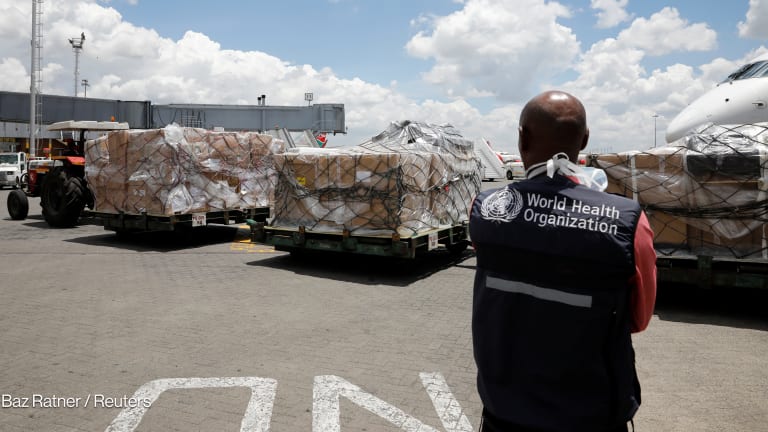
Countries have agreed to extend the work of the member state-led group set up to find a solution to the World Health Organization’s unsustainable financing until the 75th World Health Assembly, after talks to increase the agency’s assessed contributions failed to reach consensus.
While there’s an understanding among member states that WHO’s current funding model is unsustainable, not everyone was in agreement to increase their assessed contributions to the organization, said Björn Kümmel, the German diplomat who chairs the WHO Working Group on Sustainable Financing, on Tuesday during the 150th session of the WHO Executive Board.
The must-read weekly newsletter for exclusive global health news and insider insights.
While the organization has seen an increase in voluntary contributions over the years, assessed contributions are a flexible and predictable source of funding for the organization that allows it to allocate resources as needed across its programs. However, it only covers 16% of the organization’s total budget today.
One of the proposals of the working group was for member states to gradually increase their assessed contributions, starting in 2024, to cover 50% of WHO’s core budget by 2029. But member states were unable to reach consensus on the proposal to date, even after appeals from global health organizations and recommendations from independent reviews.
“We didn't reach a consensus upon this recommendation, which is often described as being the meat of all the recommendations,” Kümmel said.
While some member states have expressed “clear support” for the increase, there were others who stated it was “not ambitious enough” and others who said they are “unable to increase and agree upon an increase in the assessed contributions,” he said, adding the “limited time” they have as a factor.
Some member states at the meeting expressed their disappointment and regret that no agreement has been reached, but are hopeful that member states will arrive at a decision during the WHA in May. However, increasing WHO’s assessed contribution looks uncertain, with several member states expressing reservations for it given the ongoing COVID-19 pandemic and its impact on their own economies.
Others have also underscored the need for reforms to match the significant increase in assessed contributions, and believe WHO can be more efficient and seek further savings.
The United States wants to “better understand the current funding mechanisms, efficiencies and decision making before considering an increase in assessed contributions,” said Loyce Pace, assistant secretary for global affairs at the U.S. Department of Health and Human Services, while adding that an increase in flexible voluntary contributions is a “key component of achieving sustainable financing” within the organization.
“We didn't reach a consensus upon this recommendation, which is often described as being the meat of all the recommendations.”
— Björn Kümmel, chair, WHO Working Group on Sustainable FinancingParaguay thinks a replenishment fund involving voluntary contributions is “worth studying,” while Thailand called on member states and WHO’s other donors to provide fully unearmarked voluntary contributions to WHO. The Netherlands, meanwhile, said more clarity is needed on the governance issues within the organization and possible solutions, and proposed creating a member state-led task team for this purpose.
In his remarks, WHO Director-General Tedros Adhanom Ghebreyesus acknowledged member states’ ask for greater accountability and transparency within WHO, and reiterated his commitment to it. But he also hopes that it won’t be used as a precondition for increasing the agency’s assessed contributions.
“Because since the accountability and transparency [efforts] we have already started. If it's taken as a precondition, we will move in a vicious circle,” he said, while adding that improving the agency’s transparency and accountability is “a must” even without conditions in place.
Earlier in the week, Tedros appealed to member states to “entrust us [WHO] with the resources to deliver the results you rightly expect.” He said if WHO’s current funding setup continues, “WHO is being set up to fail.”









